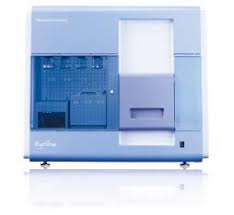GAIIx is a sequencer released by Illumina in January 2006.
It is based
on Sequencing by Synthesis (SBS).

Photo of GAIIx: https://www.illumina.com/content/dam/illumina-marketing/documents/products/specifications/specification_genome_analyzer.pdf by Illumina
Specifications
| Manufacturer |
Illumina |
| Technology |
Sequencing by Synthesis (SBS) |
| Release date |
January 2006 |
| Price [2] |
$250,000
MSRP as of release date
|
| Type |
Benchtop |
Weight |
187 Kg |
| Supports real-time analysis |
No |
| Demultiplexing support |
Yes |
| File format |
FASTQ |
| Read length |
Illumina GAIIx: 1x35bp to 2x150bp
|
| Run time |
Illumina GAIIx: 48 hours to 336 hours
|
| Reagent cost per Gb [1] |
Illumina GAIIx: Unavailable
|
| Data quality [3] |
Illumina GAIIx: Greater than 85% bases higher than Q30
|
| Maximum output per run (Gb)[4] |
Illumina GAIIx: 95.00
|
| Primary error type [5] |
Substitutions |
Notes about the specifications
More about the GAIIx
The Illumina Genome AnalyzerIIX (GAIIx) was a powerful next-generation sequencing (NGS) instrument known for its high throughput and accuracy. While now discontinued, it played a significant role in advancing genomics research in the early 2010s. The GAIIx was a significant upgrade over its predecessor, the Illumina Genome Analyzer (GA), and was ultimately succeeded by Illumina's HiSeq series. It was particularly successful in the whole-genome sequencing and resequencing markets.
Key Innovations
- Enhanced Optics and Detection: The GAIIx incorporated refined optics, lasers, and a more sensitive CCD camera than earlier models. These improvements increased signal-to-noise ratios, thus improving accuracy.
- Increased Cluster Density: Illumina achieved higher cluster densities on the flow cell surface. This denser packing enabled a massively higher sequencing output per run.
- Pared-End Sequencing Capability: The GAIIx introduced paired-end sequencing, generating reads from both ends of a DNA fragment. Paired-end reads substantially improve genome assembly and structural variant detection.
Features and Technologies
- Sequencing by Synthesis (SBS): Like other Illumina platforms, the GAIIx employed SBS chemistry. Fluorescently labeled nucleotides are sequentially incorporated, with images captured after each flow cycle to determine the added base. High-quality image data is crucial in this process.
- Bridge Amplification: Illumina’s proprietary bridge amplification created dense clusters of identical DNA templates on the flow cell. This signal amplification was key to achieving a detectable output when sequencing single molecules.
- Data Quality: The GAIIx achieved base call accuracy exceeding 99% for more than 85% of bases, with the ability to produce up to 150 gigabases of sequencing data per run.
Intended Uses and Specific Applications
The Illumina GAIIx was well-suited to numerous applications:
- Whole Genome Sequencing: For both human and model organism research.
- Resequencing: Targeting and sequencing specific genomic regions of interest.
- Transcriptome Sequencing (RNA-Seq): Analyzing gene expression patterns
- As Illumina has discontinued support, there are no official library prep kits available for purchase that are suitable.
Comparison with Competing Instruments
- Illumina NextSeq 550: The NextSeq 550 offers higher max output per run than the GAIIx at faster run times and similar read lengths, although the NextSeq 550 offers much more flexibility with the different output modes.
- DNBSEQ-G99: Although the DNBSEQ-G99 can offer less max output, it has significantly faster run time and has slightly higher accuracy, especially for the shorter read lengths.
- Ion Torrent Genexus: The Genexus can produce less max output than the GAIIx, but its run times are much faster and then read lengths are also longer (up to 400 bp).
Special Considerations
Since the GAIIx is discontinued, researchers considering it would likely be looking at the secondary market. Key considerations include:
- Availability and Cost: Used GAIIx instruments may present a cost-effective option, but availability can be limited.
- Support and Maintenance: Illumina no longer supports the GAIIx. Researchers would need to secure third-party maintenance and reagents or be capable of in-house troubleshooting.
- Data Output: If high throughput is not a top priority, the output of a GAIIx may be sufficient compared to the investment in newer platforms.
Need sequencing done on a Illumina GAIIx or a specific instrument? Tell us about your project here, and we'll connect you with a qualified provider.
This information on this page is up-to-date as of April 18, 2024 and based on the spec
sheets published by the manufacturer.